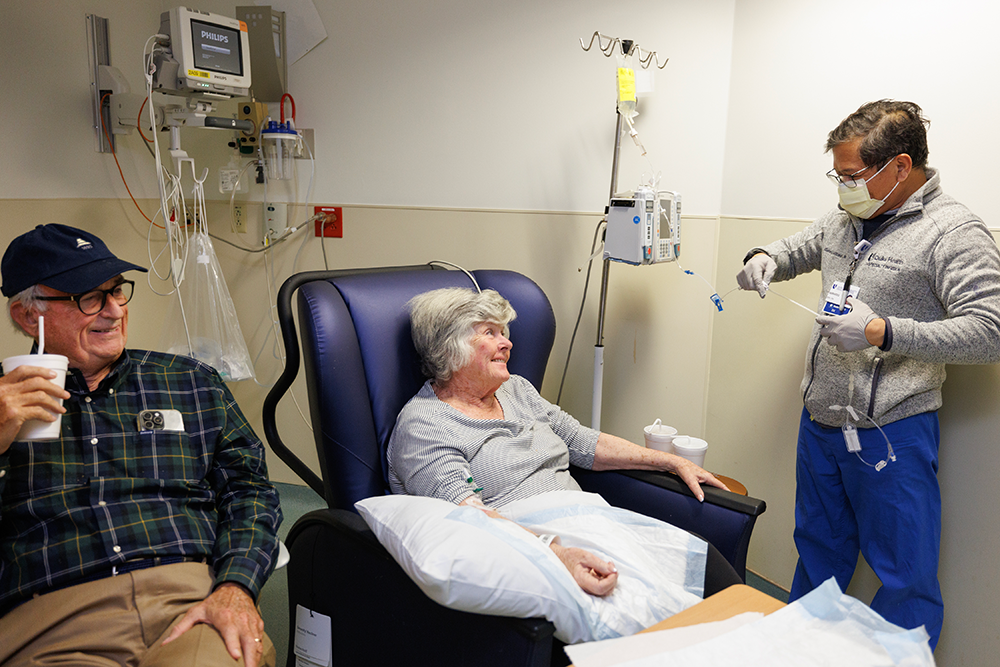
Alzheimer’s Clinic Provides Time and Hope
Steve Smith’s children were home for the holidays in 2023 when his daughter noticed that something seemed a little off. “She said, ‘Dad, you’re kind of missing some things. It’s like you’re having trouble finishing your thoughts,’” recalled Smith, who retired in 2016 after a long career in leadership, first as brigadier general in the U.S. Army and then as director of human resources for Duke University Hospital and Duke University Health System.
His primary care doctor ran some cognitive assessments and referred Smith to a specialist. Further tests produced a result no one ever wants to hear: Alzheimer’s disease.
For Smith, the diagnosis was doubly devastating. His wife, Luci, has pulmonary fibrosis, and Smith is her primary caretaker; he likes to tell people his career path has led from Army officer to HR director to Candy Striper.
“Next thing I know, I was told I had Alzheimer’s, and I was in an absolute panic,” he said. “All I could think was, ‘How am I going to take care of my wife?’”
Smith happened to have a regular breakfast meeting scheduled with William Fulkerson, MD, former executive vice president of Duke University Health System. Fulkerson took one look at him and asked whether he was OK.
“I said, ‘No, I’m panicky,’ and told him what was happening,” Smith recalled. “He said, ‘OK, don’t panic. There is hope here,’” Smith recalled. “And then he told me about this new medication.”
A Breakthrough

Lecanemab, the first drug targeting the underlying processes of Alzheimer’s disease that has shown a clinical benefit, was approved by the U.S. Food and Drug Administration in early 2023 for the treatment of early Alzheimer’s. Delivered by regular infusions every two weeks, the drug reduces beta-amyloid plaques that form in the brain, one of the defining features of the disease.
In clinical trials, lecanemab substantially reduced beta-amyloid and slowed the progression of cognitive symptoms by some 27% over 18 months.
“That’s significant,” said Kim G. Johnson, MD, assistant professor of psychiatry and behavioral sciences and division chief of Memory Disorders in the Department of Neurology. “It’s an exciting treatment, because this is the first drug to receive traditional FDA approval for Alzheimer’s in about 20 years. It’s not a cure, but trials indicate that it affects the disease.”
After extensive internal discussions, Duke became the first institution in North Carolina to offer lecanemab in the spring of 2023.
From One to Many
Barbara Goodmon was a patient of Johnson’s with mild cognitive impairment as well as amyloid plaques and other markers of early Alzheimer’s disease. She and her husband, Jim Goodmon, had spent frustrating months searching for clinical trials or other avenues she might qualify for.
“You just start searching for solutions,” said Jim Goodmon, CEO and chairman of the board of directors at Capitol Broadcasting Company. “We’d find a study and get excited, and then they’d say, ‘No, her Alzheimer’s isn’t advanced enough,’ and you’re back to square one. When Dr. Johnson told us about this new drug, we thought, ‘Now there’s some action we can take.’”
Lecanemab is not approved for all Alzheimer’s patients, and it can carry serious side effects, including the risk of swelling or bleeding in the brain. Potential patients are rigorously screened to assess possible risk factors before being approved for treatment, and those receiving treatment undergo regular MRI imaging to monitor for complications.

Barbara Goodmon underwent a battery of tests and was determined to be a suitable candidate for the new treatment. On May 11, 2023, she came to Duke and became the first patient in North Carolina to receive the first drug approved for Alzheimer’s disease in two decades.
“They’re a wonderful team,” she said of Johnson and the rest of the infusion unit. “It’s very well organized, and they take very good care of us.”
For the first few months, Barbara was the only patient in the clinic. The FDA had given lecanemab accelerated approval in January 2023, but Medicare, Medicaid, and most insurance companies don’t generally cover accelerated approval drugs. The new drug was financially out of reach for the vast majority of patients.
That changed in July 2023, when the FDA switched lecanemab’s status to “traditional approval.” Medicare, Medicaid, and insurers got on board, and the drug is now available to a much larger population.
As a result, the Duke lecanemab program has dramatically expanded. It’s the largest program in the state, with some 150 patients now coming in for infusions every other week. Johnson and her team also consult with other institutions to give even more people a chance at treatment. A second drug that acts similarly, donanemab, has also been approved by the FDA.
Moving the Field
Johnson said the program is making a big difference, and not only to the patients who receive infusions. It’s raising awareness and reducing the stigma of Alzheimer’s disease. It’s bringing more people into the clinic, which helps lead to earlier diagnoses. Even those patients who don’t qualify for lecanemab are gaining information, accessing resources, and signing up for clinical trials.
“If we are ever going to learn more about the causes and develop a cure for Alzheimer’s disease, we need more public awareness,” she said. “That’s what happened with cancer. A patient with a cancer diagnosis used to have little hope. Then efforts were made to educate people about the potential for new treatments, and more funding for research started to come in, and now many cancers can be effectively treated. We need to see the same thing with Alzheimer’s, and just having this drug and this clinic available is helping to do that. This is helping to move the field forward, and it is going to lead to new treatments and hopefully eventually a cure.”
Steve Smith has been going to the Duke clinic for infusions since last May. He doesn’t know what the long road holds, he said, but for now he feels good, and his most recent scans were stable.
“The minute I got to the clinic and put myself in their hands, for the first time I felt, ‘OK, this is not the end of the world,’” he said. “They are amazing. I think we’re off to a pretty good start. Hopefully I’ll be stabilized for some period of time and make sure we’re in good shape for Luci if things don’t go the way we would like. For so long, there was no real progress on this horrible disease. Now we have something that can give hope. And faith, family, friends, and hope are incredibly powerful.”
Dave Hart is the Editorial Director
Photos by Eamon Queeney, Assistant Director, Multimedia & Creative
Office for Strategic Communications, Duke University School of Medicine
